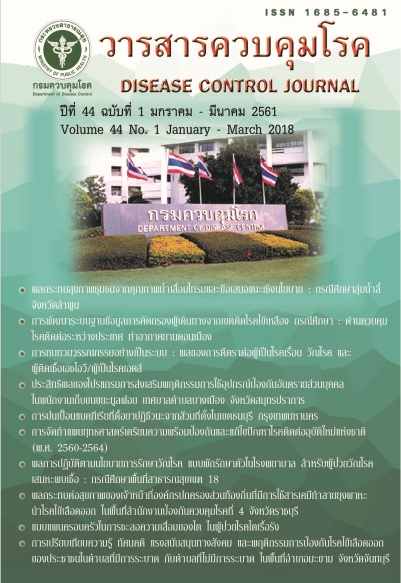Community health impact of degradation water quality and policy recommendation: case study of Li watershed, Lamphun Province
DOI:
https://doi.org/10.14456/dcj.2018.1Keywords:
Community health impact, water quality, policy recommendations, Li watershedAbstract
The objective of this study was to investigate community health impact of degradation water quality and policy recommendation on people in Li watershed. This article presents a mixed methodological approach. 323 households who lived in the communities and 14 stakeholders were participated in this study. Questionnaires, focus group discussion and stakeholder workshop were used as tools for data collecting. Data were analyzed by descriptive statistics and content analysis. The results indicated that community health impact of degradation water quality was moderate (x= 1.88). The public has made policy recommendations to address activities and learning promotion of water quality to civil society, empowering communities to manage water resource under the concept of ecological culture and make of water quality knowledge.
Downloads
References
2. Ratha Chea, Gael Grenouillet, Sovan Lek. Evidence of water quality degradation in lower Mekong basin revealed by self-organizing map. Battambang City: University of Battambang; 2016.
3. กรมควบคุมมลพิษ.ข้อมูลตัวชี้วัด“คุณภาพน้ำแหล่งน้ำผิวดินที่สำคัญทั่วประเทศ”.กรุงเทพมหานคร: กระทรวงทรัพยากรธรรมชาติและสิ่งแวดล้อม; 2560.
4. สถาบันวิจัยสังคม.โครงการจัดทำร่างแผนจัดการทรัพยากรธรรมชาติและสิ่งแวดล้อมฉบับประชาชน : กรณีศึกษาจังหวัดลำพูน. เชียงใหม่: สถาบันวิจัย สังคม มหาวิทยาลัยเชียงใหม่; 2560.
5. สำนักงานสิ่งแวดล้อมภาค 1. รายงานสถานการณ์ผลการติดตามตรวจสอบและเฝ้าระวังคุณภาพน้ำ แหล่งน้ำผิวดิน. เชียงใหม่:กระทรวงทรัพยากรธรรมชาติและสิ่งแวดล้อม; 2560.
6. สามารถ ใจเตี้ย, ชวลิต วโรดมรังสิมันตุ, ถาวร มาต้น, พีรญา อึ้งอุดรภักดี. คุณภาพชีวิตและข้อเสนอแนะ เชิงนโยบายเพื่อลดผลกระทบต่อคุณภาพชีวิตจาก ความเสื่อมสภาพของแม่น้ำลี้ จังหวัดสำพูน.วารสาร การจัดการสิ่งแวดล้อม 2558;11:38-51.
7. หน่วยศึกษาและเฝ้าระวังมลพิษทางน้ำ. รายงาน สรุปผลการศึกษาพื้นที่และแหล่งน้ำที่เสี่ยงต่อ การเกิดมลพิษทางน้ำในประเทศไทย. กรุงเทพมหานคร: กรีนพีชเอเชียตะวันออกเฉียงใต้; 2552.
8. การประปาส่วนภูมิภาค สาขาบ้านโอ่ง. ระบบผลิต. เชียงใหม่: การประปาส่วนภูมิภาค สาขาบ้านโอ่ง; 2560.
9. Wayne W. Daniel. Bio statistic S: a foundation for analysis in the health sciences. 6th ed. New York: John Wiley & Sons; 1995.
10. โรงพยาบาลทุ่งหัวข้าง. จำนวนผู้ป่วยโรคอุจาระร่วง จำแนกรายเดือน. ลำปาง: โรงพยาบาลทุ่งหัวข้าง; 2560.
11. Juergen G. Integrative freshwater ecology andbiodiversity conservation. Ecological Indicators 2011;11:1507-16.
12. พร สุวรรณทีป. แนวทางการพัฒนาการมีส่วนร่วม ในการใช้ทรัพยากรน้ำของแม่น้ำลี้ตอนกลาง
ตำบลแม่ตืน อำเภอลี้ จังหวัดลำพูน [วิทยานิพนธ์ ปริญญารัฐประศาสนศาสตรมหาบัณฑิต]. ขอนแก่น:มหาวิทยาลัยขอนแก่น; 2550.
Downloads
Published
How to Cite
Issue
Section
License
Articles published in the Disease Control Journal are considered as academic work, research or analysis of the personal opinion of the authors, not the opinion of the Thailand Department of Disease Control or editorial team. The authors must be responsible for their articles.






